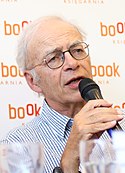Peter Singer Quote
There are some things that, once lost, no amount of money can regain. Thus to justify the destruction of an ancient forest on the grounds that it will earn us substantial export income is problematic, even if we could invest that income and increase its value from year to year; for no matter how much we increase its value, its could never buy back the link with the past represented by the forest.
Peter Singer
There are some things that, once lost, no amount of money can regain. Thus to justify the destruction of an ancient forest on the grounds that it will earn us substantial export income is problematic, even if we could invest that income and increase its value from year to year; for no matter how much we increase its value, its could never buy back the link with the past represented by the forest.
Related Quotes
Zeena Schreck is a Berlin-based interdisciplinary artist, author, musician/composer, tantric teacher, mystic, animal rights activist, and counter-culture icon known by her mononymous artist name, ZEEN...
Zeena Schreck
Tags:
animal activism, animal liberation, animal rights, animals, animism, art, artist, artists, bhakti, composers
Science is not a democracy. Therefore to try to pass of global warming as real just because "98% of scientists say they agree" makes no sense at all. If 98% of psychiatrists said that all mentally ill...
Rebecca McNutt
Tags:
agree, bridge, climate change, democracy, earth, environmentalism, global warming, heretic, hippie, jump
The prints shop manager, a balding man of about thirty years old, dressed in a plaid work shirt and faded jeans, looked very shocked when he saw the headline text. Sydney Tar Ponds, Is It As Dangerous...
Rebecca McNutt
Tags:
career, earth, earth day, environmentalism, go green, green, hippie, industry decline, job, manager
About Peter Singer
Peter Albert David Singer (born 6 July 1946) is an Australian moral philosopher who is Emeritus Ira W. DeCamp Professor of Bioethics at Princeton University. Singer's work specialises in applied ethics, approaching the subject from a secular, utilitarian perspective. He wrote the book Animal Liberation (1975), in which he argues for vegetarianism, and the essay "Famine, Affluence, and Morality", which argues the moral imperative of donating to help the poor around the world. For most of his career, he was a preference utilitarian, but he revealed in The Point of View of the Universe (2014), coauthored with Katarzyna de Lazari-Radek, that he had become a hedonistic utilitarian.
On two occasions, Singer served as chair of the philosophy department at Monash University, where he founded its Centre for Human Bioethics. In 1996 he stood unsuccessfully as a Greens candidate for the Australian Senate. In 2004 Singer was recognised as the Australian Humanist of the Year by the Council of Australian Humanist Societies. In 2005, The Sydney Morning Herald placed him among Australia's ten most influential public intellectuals. Singer is a cofounder of Animals Australia and the founder of the non-profit organization The Life You Can Save.
On two occasions, Singer served as chair of the philosophy department at Monash University, where he founded its Centre for Human Bioethics. In 1996 he stood unsuccessfully as a Greens candidate for the Australian Senate. In 2004 Singer was recognised as the Australian Humanist of the Year by the Council of Australian Humanist Societies. In 2005, The Sydney Morning Herald placed him among Australia's ten most influential public intellectuals. Singer is a cofounder of Animals Australia and the founder of the non-profit organization The Life You Can Save.
